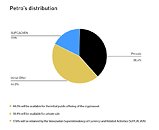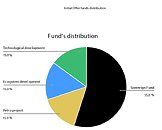Raevenlord
News Editor
- Joined
- Aug 12, 2016
- Messages
- 3,755 (1.18/day)
- Location
- Portugal
| System Name | The Ryzening |
|---|---|
| Processor | AMD Ryzen 9 5900X |
| Motherboard | MSI X570 MAG TOMAHAWK |
| Cooling | Lian Li Galahad 360mm AIO |
| Memory | 32 GB G.Skill Trident Z F4-3733 (4x 8 GB) |
| Video Card(s) | Gigabyte RTX 3070 Ti |
| Storage | Boot: Transcend MTE220S 2TB, Kintson A2000 1TB, Seagate Firewolf Pro 14 TB |
| Display(s) | Acer Nitro VG270UP (1440p 144 Hz IPS) |
| Case | Lian Li O11DX Dynamic White |
| Audio Device(s) | iFi Audio Zen DAC |
| Power Supply | Seasonic Focus+ 750 W |
| Mouse | Cooler Master Masterkeys Lite L |
| Keyboard | Cooler Master Masterkeys Lite L |
| Software | Windows 10 x64 |
Blockchain technologies will eventually change the world, eventually. Whether or not cryptocurrencies will be part of that world, however, is still up for debate. Venezuela, however, is looking to reap dividends from the current cryptocurrency craze before the final answer to that question has a chance of being answered. As the country has entered a severely crippled economic and civil state, the search for a way to raise government funds has led to the development of the petro cryptocurrency - which is linked, as one would expect, to the country's primary export and income source: oil.
As part of the petro pre-sale, investors were being offered $60 petro tokens at discounted rates that they can exchange for actual petros during a planned Mars ICO (Initial Coin Offering). After that ICO has been gone through, a petro will supposedly represent a barrel of crude from a specific division in the country's Orinoco oil belt. Is this a pre-buy for a barrel of crude of sorts? It seems so. It's also an extremely risky move for investors, though, but nothing that they aren't used to already: futures trading does exist, after all.


It's been a convoluted launch, which still hasn't been cleared on whether or not it has concluded. Just hours before the token pre-sale was live, the petro whitepaper was changing its foundational blockchain from Ethereum to NEM. And today, Venezuela president Nicolás Maduro said that the cryptocurrency had reigned in some $735 million in funding - but apparently, a look at the NEM blockchain only shows that the petro cryptocurrency has been issued - absent of any actual transactions.


These little hiccups (that may or may not have been lost in translation) leave many analysts doubtful of the experiment's success. Alex Van de Sande, a Brazil-based developer for the Ethereum Foundation, said in a phone interview to The Washington Post that "It honestly sounds like they don't really understand how any of it works." But even as they doubt the long-term health and development of the petro ecosystem, they admit that the main idea behind petro's launch likely isn't to create an ecosystem at all, but to allow the Venezuelan government to cash in on a quick buck. "Unfortunately, that doesn't mean it won't raise money. We've seen terrible ideas that don't make any sense raise a lot of it," Alex Van de Sande continued. "If I wanted to avoid international sanctions and make money appear out of thin air in my country hiding the origin, I guess this petro would be a useful way."
View at TechPowerUp Main Site
As part of the petro pre-sale, investors were being offered $60 petro tokens at discounted rates that they can exchange for actual petros during a planned Mars ICO (Initial Coin Offering). After that ICO has been gone through, a petro will supposedly represent a barrel of crude from a specific division in the country's Orinoco oil belt. Is this a pre-buy for a barrel of crude of sorts? It seems so. It's also an extremely risky move for investors, though, but nothing that they aren't used to already: futures trading does exist, after all.


It's been a convoluted launch, which still hasn't been cleared on whether or not it has concluded. Just hours before the token pre-sale was live, the petro whitepaper was changing its foundational blockchain from Ethereum to NEM. And today, Venezuela president Nicolás Maduro said that the cryptocurrency had reigned in some $735 million in funding - but apparently, a look at the NEM blockchain only shows that the petro cryptocurrency has been issued - absent of any actual transactions.


These little hiccups (that may or may not have been lost in translation) leave many analysts doubtful of the experiment's success. Alex Van de Sande, a Brazil-based developer for the Ethereum Foundation, said in a phone interview to The Washington Post that "It honestly sounds like they don't really understand how any of it works." But even as they doubt the long-term health and development of the petro ecosystem, they admit that the main idea behind petro's launch likely isn't to create an ecosystem at all, but to allow the Venezuelan government to cash in on a quick buck. "Unfortunately, that doesn't mean it won't raise money. We've seen terrible ideas that don't make any sense raise a lot of it," Alex Van de Sande continued. "If I wanted to avoid international sanctions and make money appear out of thin air in my country hiding the origin, I guess this petro would be a useful way."
View at TechPowerUp Main Site






